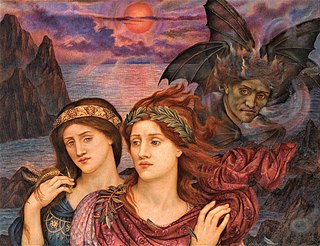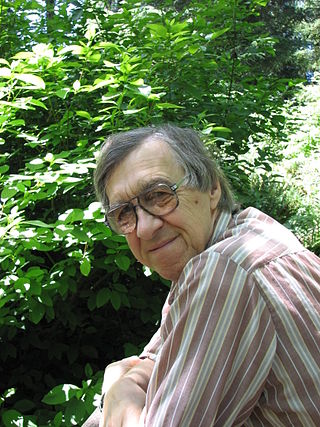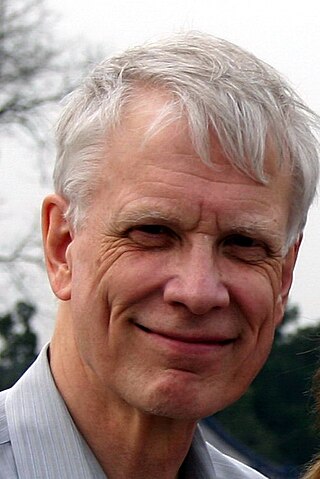Related Research Articles

Clairvoyance is the magical ability to gain information about an object, person, location, or physical event through extrasensory perception. Any person who is claimed to have such ability is said to be a clairvoyant.

Extrasensory perception or ESP, also called sixth sense, is a claimed paranormal ability pertaining to reception of information not gained through the recognized physical senses, but sensed with the mind. The term was adopted by Duke University psychologist J. B. Rhine to denote psychic abilities such as intuition, telepathy, psychometry, clairvoyance, clairaudience, clairsentience, empathy and their trans-temporal operation as precognition or retrocognition.

Parapsychology is the study of alleged psychic phenomena and other paranormal claims, for example, those related to near-death experiences, synchronicity, apparitional experiences, etc. Criticized as being a pseudoscience, the majority of mainstream scientists reject it. Parapsychology has also been criticised by mainstream critics for many of its practitioners claiming that their studies are plausible in spite of there being no convincing evidence for the existence of any psychic phenomena after more than a century of research.
Parapsychology is a field of research that studies a number of ostensible paranormal phenomena, including telepathy, precognition, clairvoyance, psychokinesis, near-death experiences, reincarnation, and apparitional experiences.

Telepathy is the purported vicarious transmission of information from one person's mind to another's without using any known human sensory channels or physical interaction. The term was first coined in 1882 by the classical scholar Frederic W. H. Myers, a founder of the Society for Psychical Research (SPR), and has remained more popular than the earlier expression thought-transference.

A psychic is a person who claims to use extrasensory perception (ESP) to identify information hidden from the normal senses, particularly involving telepathy or clairvoyance, or who performs acts that are apparently inexplicable by natural laws, such as psychokinesis or teleportation. Although many people believe in psychic abilities, the scientific consensus is that there is no proof of the existence of such powers, and describes the practice as pseudoscience. The word "psychic" is also used as an adjective to describe such abilities.

A ganzfeld experiment is an assessment used by parapsychologists that they contend can test for extrasensory perception (ESP) or telepathy. In these experiments, a "sender" attempts to mentally transmit an image to a "receiver" who is in a state of sensory deprivation. The receiver is normally asked to choose between a limited number of options for what the transmission was supposed to be and parapsychologists who propose that such telepathy is possible argue that rates of success above the expectation from randomness are evidence for ESP. Consistent, independent replication of ganzfeld experiments has not been achieved, and, in spite of strenuous arguments by parapsychologists to the contrary, there is no validated evidence accepted by the wider scientific community for the existence of any parapsychological phenomena. Ongoing parapsychology research using ganzfeld experiments has been criticized by independent reviewers as having the hallmarks of pseudoscience.
Remote viewing (RV) is the practice of seeking impressions about a distant or unseen subject, purportedly sensing with the mind. Typically a remote viewer is expected to give information about an object, event, person or location that is hidden from physical view and separated at some distance. Physicists Russell Targ and Harold Puthoff, parapsychology researchers at Stanford Research Institute (SRI), are generally credited with coining the term "remote viewing" to distinguish it from the closely related concept of clairvoyance. According to Targ, the term was first suggested by Ingo Swann in December 1971 during an experiment at the American Society for Psychical Research in New York City.
Stargate Project was a secret U.S. Army unit established in 1978 at Fort Meade, Maryland, by the Defense Intelligence Agency (DIA) and SRI International to investigate the potential for psychic phenomena in military and domestic intelligence applications. The Project, and its precursors and sister projects, originally went by various code names – 'Gondola Wish', 'Stargate', 'Grill Flame', 'Center Lane', 'Project CF', 'Sun Streak', 'Scanate' – until 1991 when they were consolidated and rechristened as "Stargate Project".

Ray Hyman is a Professor Emeritus of Psychology at the University of Oregon in Eugene, Oregon, and a noted critic of parapsychology. Hyman, along with James Randi, Martin Gardner and Paul Kurtz, is one of the founders of the modern skeptical movement. He is the founder and leader of the Skeptic's Toolbox. Hyman serves on the Executive Council for the Committee for Skeptical Inquiry.
Dean Radin investigates phenomena in parapsychology. Following a bachelor and master's degree in electrical engineering and a PhD in educational psychology Radin worked at Bell Labs, as a researcher at Princeton University and the University of Edinburgh, and was a faculty member at University of Nevada, Las Vegas. He then became Chief Scientist at the Institute of Noetic Sciences (IONS) in Petaluma, California, USA, later becoming the president of the Parapsychological Association. He is also co-editor-in-chief of the journal Explore: The Journal of Science and Healing. Radin's ideas and work have been criticized by scientists and philosophers skeptical of paranormal claims. The review of Radin's first book, The Conscious Universe, that appeared in Nature charged that Radin ignored the known hoaxes in the field, made statistical errors and ignored plausible non-paranormal explanations for parapsychological data.
Charles Henry Honorton was an American parapsychologist and was one of the leaders of a collegial group of researchers who were determined to apply established scientific research methods to the examination of what they called "anomalous information transfer" and other phenomena associated with the "mind/body problem"—the idea that mind might, at least in some respects, have a physical existence independent of the body.

Charles T. Tart is an American psychologist and parapsychologist known for his psychological work on the nature of consciousness, as one of the founders of the field of transpersonal psychology, and for his research in parapsychology.

Russell Targ is an American physicist, parapsychologist and author who is best known for his work on remote viewing.
Robert George Jahn was an American plasma physicist, Professor of Aerospace Science, and Dean of Engineering at Princeton University. Jahn was also a founder of the Princeton Engineering Anomalies Research Lab (PEAR), a parapsychology research program which ran from 1979 to 2007.
Gary E. Schwartz is an American psychologist, author, parapsychologist and professor at the University of Arizona and the director of its Laboratory for Advances in Consciousness and Health. Schwartz researches the veracity of mediums and energy healing.
Sensory leakage is a term used to refer to information that transferred to a person by conventional means during an experiment into ESP.

James E. Alcock is a Canadian educator. He has been a Professor of Psychology at York University (Canada) since 1973. Alcock is a noted critic of parapsychology and is a Fellow and Member of the Executive Council for the Committee for Skeptical Inquiry. He is a member of the Editorial Board of The Skeptical Inquirer, and a frequent contributor to the magazine. He has also been a columnist for Humanist Perspectives Magazine. In 1999, a panel of skeptics named him among the two dozen most outstanding skeptics of the 20th century. In May 2004, CSICOP awarded Alcock CSI's highest honor, the In Praise of Reason Award. Alcock is also an amateur magician and is a member of the International Brotherhood of Magicians. As of 2020, he is currently on leave from York University.

Charles Edward Mark Hansel was a British psychologist most notable for his criticism of parapsychological studies.
Stanford Research Institute in Menlo Park, California carried out research on various phenomena characterized by the term parapsychology from 1972 until 1991. Early studies indicating that phenomena such as remote viewing and psychokinesis could be scientifically studied were published in such mainstream journals as Proceedings of the IEEE and Nature. This attracted the sponsorship of such groups as NASA and The Central Intelligence Agency.
References
- ↑ Jessica Utts at the Parapsychological Association
- 1 2 Robert Todd Carroll. (2003). The Skeptic's Dictionary: A Collection of Strange Beliefs, Amusing Deceptions, and Dangerous Delusions . Wiley. pp. 331–333. ISBN 0-471-27242-6
- ↑ What educated citizens should know about statistics and probability by Jessica Utts. The American Statistician, 57(2), 74–79, 2003.
- ↑ "Jessica Utts Elected 111th ASA President". American Statistical Association. July 2014. Retrieved 5 July 2020.
- ↑ Honored Fellows, Institute of Mathematical Statistics, archived from the original on 2014-03-02, retrieved 2017-11-24
- ↑ "CURRICULUM VITAE – JESSICA UTTS". CIA Library. 24 May 1995. Archived from the original on September 25, 2016. Retrieved 18 January 2017.
- 1 2 David Marks; Richard Kammann. (2000). The Psychology of the Psychic . Prometheus Books. pp. 71–74. ISBN 1-57392-798-8
- ↑ Utts, Jessica (2018). "An Assessment of the Evidence for Psychic Functioning". Journal of Parapsychology. 82 (Suppl): 118–146. doi:10.30891/jopar.2018S.01.10. S2CID 3664988 . Retrieved 19 April 2022.
- ↑ Evaluation of a Program on Anomalous Mental Phenomena Archived 2017-06-16 at the Wayback Machine by Ray Hyman.
- ↑ Ray Hyman (2008). "The Evidence for Psychic Functioning: Claims vs. Reality". Csicop.org. Archived from the original on 2010-07-09. Retrieved 2014-07-12.
- ↑ An Evaluation of Remote Viewing: Research and Applications by Mumford, Rose and Goslin
- ↑ "About IRVA". International Remote Viewing Association.